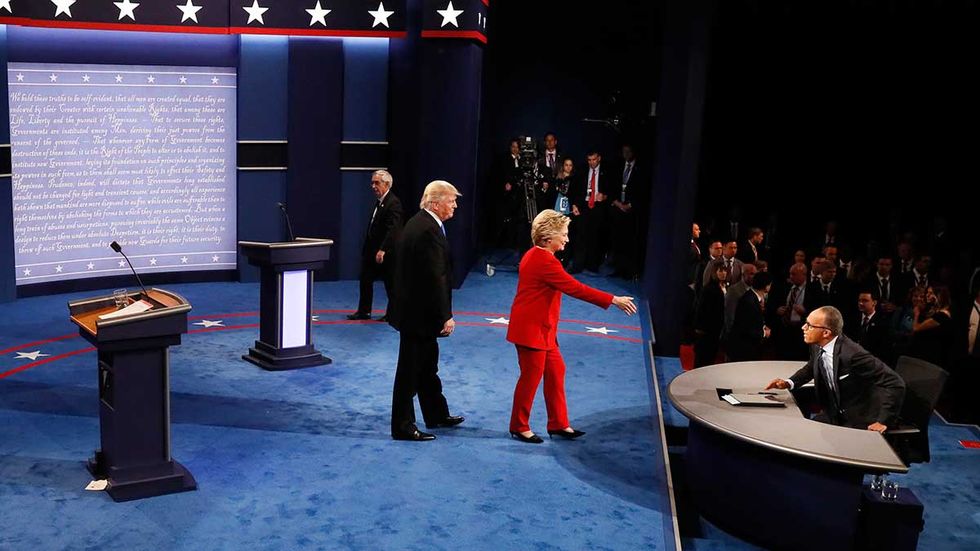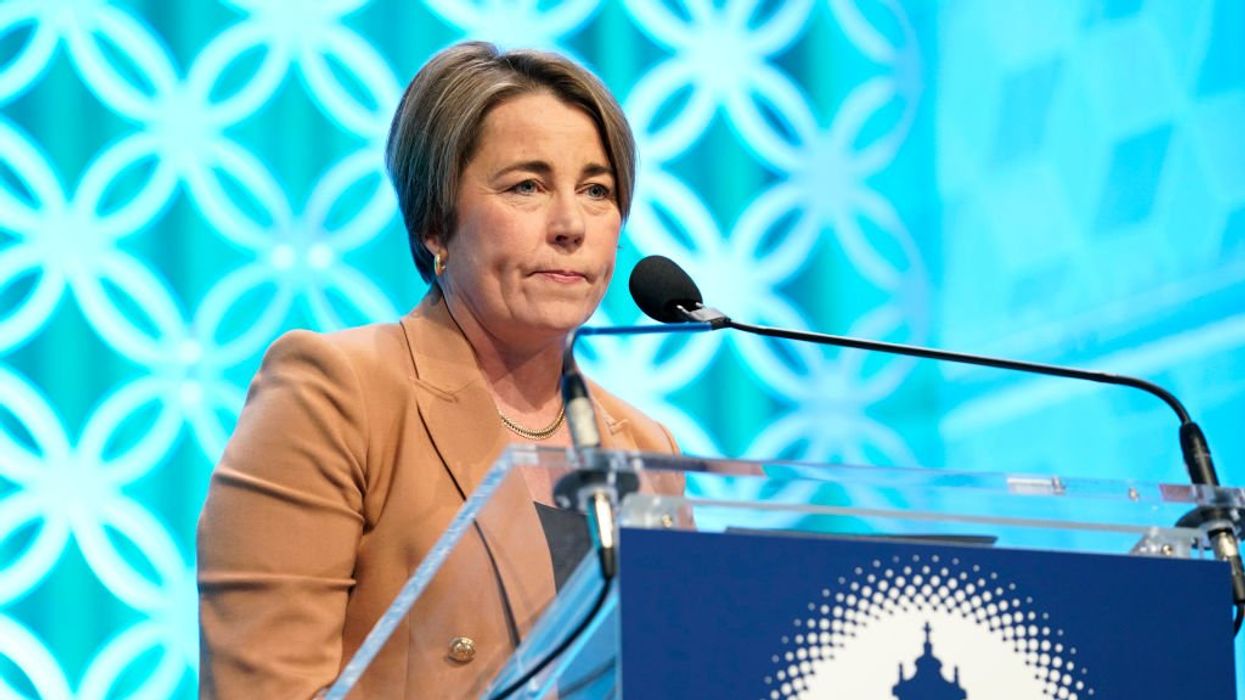
© 2024 Blaze Media LLC. All rights reserved.
Last night’s debate was a reflection of the Kim Kardashian culture and the fake two-party system that has destroyed our Constitution.
There were sharp rhetorical barbs tossed at one another in this reality TV show, but over what exactly did they debate? Where was the major point of contention on the actual issues that matter?
For all of the talk about how this election is so new, exciting, and consequential, this debate merely reflected a typical day in Washington. Harry Reid, D-Nev. (F, 2%) and Mitch McConnell, R-Ky. (F, 42%) toss rhetorical barbs at one another every day, but they fundamentally agree on so many issues. They engage in confrontation just to entertain the political class with a fake WWE-style bout.
Many of us have been pining for years to watch a general election debate in which the GOP candidate would deracinate the entire premise of socialism and pin the high cost of living, loss of jobs, and lethargic growth on the Democrats’ liberal policies. Yet, the beginning of the first presidential debate was an astounding display of “me too” socialism whereby Trump made his entire plan for economic growth centered around protectionism. Even if one subscribes to some degree of protectionism, the notion that this is a proactive tool for growth is absurd. Trump didn’t pitch his tax plan until Hillary brought it up and when she did, Trump spent more time focusing on “preventing” companies from leaving the country — whatever that means.
Trump got back on message for a few minutes when he finally defended his tax plan and spoke about onerous regulations. But fundamentally, the economic side of this debate sounded more one-sided than any presidential debate in memory, and that includes the debates with liberals like John McCain, R-Ariz. (F, 34%) and Bob Dole. It was further astounding that Trump did not mention the 800-pound gorilla on fiscal policy —Obamacare —a single time. Then again, for someone who loves expansion of Medicaid, it’s hard to articulate what exactly is wrong with Obama’s signature legislation.
The most disappointing part of the debate was when Trump enthusiastically agreed with Hillary on universal child care and maternity leave. Trump uttered a line that embodies the pale-pastel nature of the oligarchy since 1988. He asserted that while he agrees with Hillary’s program, they “probably disagree a little bit as to numbers and amounts.”
Freeze frame right there.
This is the perfect summation of the GOP since 1988, excepting for the brief aberration of the 1995 House Republicans. They agree with whatever Democrats are doing at any given time, albeit disagree over the numbers and amounts. Trump should have retorted by listing all of the Democrat policies that make it impossible for women to stay home with their children if they choose to do so because the cost of living through socialism forces both parents to work every year of their lives. Of the 14 winning issues we’ve outlined, he barely touched on a few of them and none of them in a meaningful way.
Somehow Donald Trump managed to (finally) hit Hillary on the debt, but never explained how he will end deficit spending given that he will not repeal a single program, will continue to add programs, and sign a massive stimulus bill on infrastructure projects, an idea that should be pursued by state governments.
When Hillary asserted that Trump referred to global warming as a hoax, instead of embracing the opportunity to discuss how this hoax is decimating the economy in swing states, he retreated by denying he ever said it. I think we all remember a candidate in the primary who would have relished a debate over global warming.
And while fiscal conservatism was dead in this debate, social conservatism — even social libertarianism, private property rights, religious liberty, and inalienable rights — never made an appearance.
But most of the debate wasn’t about issues — liberal or otherwise. To debate moderator Lester Holt’s credit, he let the candidates banter back and forth for most of the debate — you might even call it a debate for once. But that is the point. Given the nature of these two candidates — a tired, old Great Society culture warrior at one podium and her donor at the other — the meat of the debate was about personality. At the beginning, it was Trump’s personality who knocked Hillary off her game, but over time Hillary engaged in jujitsu by leading Trump into his own rabbit holes and in a defensive posture about his personal life and prior statements.
We already know Trump is a social and fiscal liberal on many issues, but the one saving grace has long been his strong views on immigration and national security.
Yet, when given a fast-ball up the plate to talk about his solution to homegrown terror, Trump didn’t mention immigration or the Muslim Brotherhood once or body slam Hillary for increasing refugees by 550 percent. Rather, he went off on a tangent about NATO, got caught on his past statements on Iraq, and was ensnared in a lengthy discussion about birtherism.
When Hillary brought up the issue of gun control and the terror watch list, Trump could have destroyed her on bringing in assault people while foolishly focusing on the inanimate object. He could have exposed her hypocrisy of confiscating guns from innocent people on the list (a prominent journalist wound up on the list) while vigorously clamoring to let violent gun felons out of jail. He could have demonstrated how Hillary wants to go after guns without due process but opposes stripping individuals of citizenship after being convicted through due process of joining a terror group. Instead, he chose the age-old milquetoast GOP approach, the same strategy he employs on so many fiscal issues; he “strongly” agreed with Hillary, thereby throwing the NRA under the bus.
The one area of strength for Trump, however, was the discussion on law and order and how Hillary’s pro criminal policies will hurt inner cities. Trump was also on message when discussing Hillary’s failures in the Middle East, but that line of attack was overshadowed when he got trapped in his past statements on Iraq and his support for the Libya intervention. Furthermore, his answer to the question on nuclear weapons and North Korea was literally incomprehensible…as in weapons-grade stupid.
I couldn’t help but reflect with sorrow of how 52 years after Phyllis Schlafly called for “a choice, not an echo” in our political system. Today, we still hear the faint echo on policy from Republicans — yes, even this new and exciting one — drowned out by the raucous noise of the personal insults. When you strip away the WWE smack-down, there is no choice there.
For those who still desire to beat Hillary at all costs, I don’t blame you. But don’t kid yourselves: if Trump wins on November 8, the work would have only begun. We will have his incoherent luggage piled on top of the existing GOP establishment, which is more empowered than ever before. Blindly cheering everything we fought against for years – without immediately charting a new path for conservatism – won’t end well.
Until Americans return to the values that made this country great in the first place and seize the monopoly away from the oligarchy, we will continue to get the same failed leadership and the same indistinguishable choices every four years. And we deserve it.
Want to leave a tip?
We answer to you. Help keep our content free of advertisers and big tech censorship by leaving a tip today.
Want to join the conversation?
Already a subscriber?
Blaze Podcast Host
Daniel Horowitz is the host of “Conservative Review with Daniel Horowitz” and a senior editor for Blaze News.
RMConservative
more stories
Sign up for the Blaze newsletter
By signing up, you agree to our Privacy Policy and Terms of Use, and agree to receive content that may sometimes include advertisements. You may opt out at any time.
© 2024 Blaze Media LLC. All rights reserved.
Get the stories that matter most delivered directly to your inbox.
By signing up, you agree to our Privacy Policy and Terms of Use, and agree to receive content that may sometimes include advertisements. You may opt out at any time.



